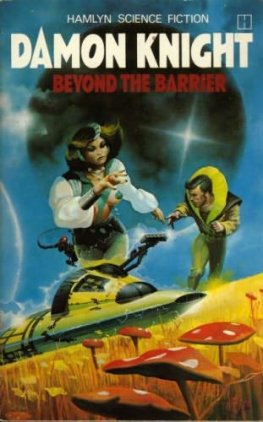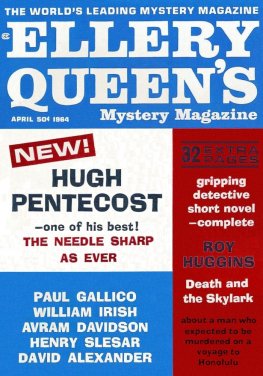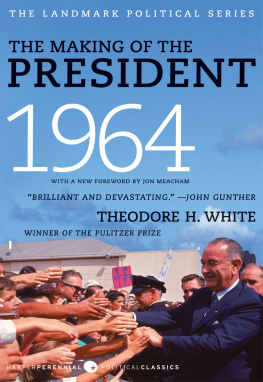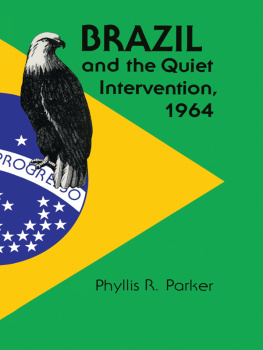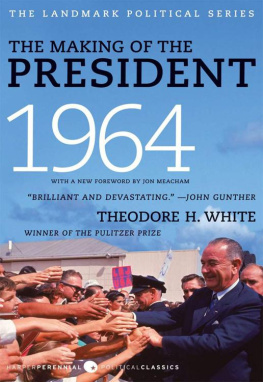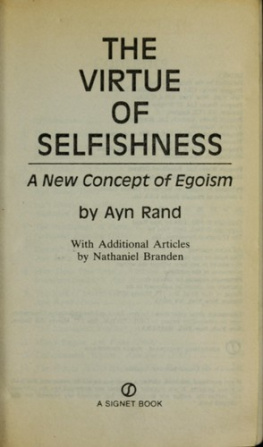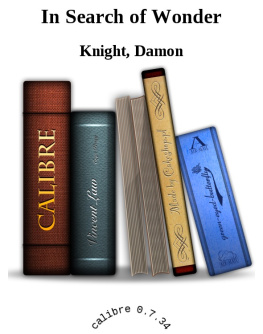Damon Knight - Beyond the Barrier
Here you can read online Damon Knight - Beyond the Barrier full text of the book (entire story) in english for free. Download pdf and epub, get meaning, cover and reviews about this ebook. year: 1964, genre: Science fiction. Description of the work, (preface) as well as reviews are available. Best literature library LitArk.com created for fans of good reading and offers a wide selection of genres:
Romance novel
Science fiction
Adventure
Detective
Science
History
Home and family
Prose
Art
Politics
Computer
Non-fiction
Religion
Business
Children
Humor
Choose a favorite category and find really read worthwhile books. Enjoy immersion in the world of imagination, feel the emotions of the characters or learn something new for yourself, make an fascinating discovery.
- Book:Beyond the Barrier
- Author:
- Genre:
- Year:1964
- Rating:5 / 5
- Favourites:Add to favourites
- Your mark:
- 100
- 1
- 2
- 3
- 4
- 5
Beyond the Barrier: summary, description and annotation
We offer to read an annotation, description, summary or preface (depends on what the author of the book "Beyond the Barrier" wrote himself). If you haven't found the necessary information about the book — write in the comments, we will try to find it.
Damon Knight: author's other books
Who wrote Beyond the Barrier? Find out the surname, the name of the author of the book and a list of all author's works by series.
Beyond the Barrier — read online for free the complete book (whole text) full work
Below is the text of the book, divided by pages. System saving the place of the last page read, allows you to conveniently read the book "Beyond the Barrier" online for free, without having to search again every time where you left off. Put a bookmark, and you can go to the page where you finished reading at any time.
Font size:
Interval:
Bookmark:
BEYOND THE BARRIER
by Damon Knight
Chapter One
The banked, fan-shaped classroom was silent with attention.
And now, said Professor Gordon Naismith, watch closely.
I drop the charged particle into the tank. He tripped the release of the mechanism suspended over the big glass tank, and saw a silvery spicule drop, almost too quickly to follow, into the clear liquid.
Contact with other partially charged molecules releases the time energy, said Naismith, watching a sudden silvery cloud spread from the bottom of the tank, and, as you see
The silvery cloud grew rapidly, advancing on a wave front, a beautifully symmetrical curve that was determined by two factors: gravity, and the kinetic loss of the conversion process.
It was perfect beauty, far beyond any curve of flesh or any line drawn by an artist, and Naismith watched it with a painful tightness in his throat, although he had seen it a hundred times before.
Now the change was complete. The tank was full of silvery fluid, opaque, mirror-bright and luminous. All the liquid has now been raised to a higher temporal energy level, Naismith told the class, and is in the state you may have heard described as quasi-matter. Tomorrow, when we begin our experiments on this tank, we will see that it has some very odd physical properties. However, that concludes todays demonstration. Are there any questions?
A student signaled with his desk light. Naismith glanced at the nameplate. Yes, Hinkel? He stood beside the table on the dais, tall and big-framed in his laboratory smock, aware as he answered the students questions that eight other Naismiths, in the other identical classrooms that radiated from a common center, were also standing, like eight mirror images of himself, also answering questions. It gave him an eerie shiver, just for a moment, to realize that he himself was one of the doppelgangers, not the real Naismithsomehow that was almost impossible to accept, no matter how often one went through the experience then the moment passed, and he went on talking, calm, self-assured, his voice controlled and resonant.
The tone sounded, and the students began to stir, gathering their recording equipment and sliding out of their seats.
Naismith turned and fumbled for the duplicator control. The round brownish-black knob was hard to see, like a floating shadow on the tabletop. He found it at last, and turned it clockwise.
At once the half-empty classroom vanished. He was in the tiny, circular control room, alone except for the duplicator apparatus. His knees suddenly weak, he leaned against the demonstration table. Discordant memories swarmed through his headnine sets of them, all at once, like interfering video broadcasts. It was hard to take, just for a moment, but after two years of it he was an experienced multiple-class teacher, and the nine sets of memories settled quickly into place in his mind.
As he prepared to leave, he became aware of an odd thing that had happened. The demonstration itself had been exactly the same in all nine classrooms, of course; it was only the questions afterward that had been different, and even those followed a familiar pattern.
But one of the students inwhich was it? classroom 7had stepped up to the platform just as he was about to leave, and had said something extraordinary.
He stood still, trying to bring the memory into sharper focus.
It was a dark-skinned girl who sat in the second row: Lall was her name, probably Indian, although it was odd that she sat apart from the whispering, giggling group of Indian girls, bright in their saris and gold earrings, who perched at the top of the classroom. She had looked up at him with her oddly disturbing amber eyes, and had said in a distinct voice: Professor, what is a Zug?
Nonsensical question! It had nothing to do with the demonstration, or with temporal energy at allin fact, he was sure there was no such word in the vocabulary of physics. And yet it was odd what a shock had gone through him at her words: as if, deep down in his subconscious, the question did mean somethingand something vital. He could remember snapping to attention, all his senses taut, a cold sweat beading on his forehead.
And then what? What had he replied?
Nothing.
At that moment, the action of turning the control knob had been completed, and he had come out of the multiple state.
Then the shock of reintegrating his consciousness, and now
Zug.
The word had an unpleasant sound, somehow; it made a shudder of distaste run up his spine. Probably the girl was disturbed, that was all; he would put in a query to the college psychiatric office.
But as he left the control room, taking the rear stair to his office, the feeling of vague apprehension and unease lingered.
Perhaps it was the strain of multiple-class work; not everyone could bear it. But he was proud of his ability to stand up under the load; he had never felt like this after a class.
He finished his days record-keeping and left quickly, anxious to be out in the air. The afternoon was sunny and warm as he walked across the campus; he could hear the surf in the distance, and the Inglewood-Ventura monorail went hushing across, bright cream and tan against the blue sky.
Students were walking in little groups along the gravel paths between the flame trees. The lawns were richly green, neat and trim. The scene was familiar, soothing and not entirely real.
It depressed him to realize that after four years he still felt essentially disoriented. Everyone said he had made a remarkable recovery; he had passed his refresher courses with high marks, gotten his teaching license renewed: now he was established, competent . . and after all, these four years were all the memory he had: so why couldnt he settle down and feel at home?
Why should he feel there was some terrible secret buried in his past?
Irritated, he tried to shake off the mood, but the girl and her question kept coming back to the surface of his mind. It was ridiculous, and yet he couldnt help wondering if perhaps she had some connection with the lost thirty-one years of his life
the blank, the emptiness that was his image of himself before the bomber crash that had almost killed him.
Zug
Impulsively, he turned and took the path to the university library. There was a vacant information machine. He punched
General, and then spelled out Z-U-G.
The machines transparency flashed, SEARCHING, and then, after a second, GEOGRAPHY (EUROPA). On the central screen appeared a portion of a page of text. Naismith read, Zug. (tsooK) 1. Canton, n. central Switzerland, area 92 square miles. Pop. 51,000. 2. Commune, its capital, on Lake of Zug S of Zurich; pop. 16,500.
Naismith turned off the machine in disgust. Of course, he was wasting his time. It was a little surprising that there should be such a word at all; but the girl had said a Zug and besides, she hadnt pronounced it as if it were German. This couldnt be the answer.
As he was leaving the library, he heard his name called.
Plump Mr. Ramsdell, the bursar, came hurrying toward him along the graveled path between the flame trees, holding out a parcel wrapped in white paper. How lucky to run into you like this, Ramsdell panted. Someone left this at my office for you, and I absent-mindedly carried it out with me He laughed uncertainly. I was just going to take it over and drop it at the Science Building, when I saw you.
Naismith took the parcel: it was unexpectedly heavy and hard inside the white paper. Thanks, he said. Who left it for me, anyone I know?
Ramsdell shrugged. Said his name was Churan. Short, swarthy fellow, very polite. But I really wasnt paying attention.
Well, I must fly.
Thanks again, Naismith called after him, but the little bursar did not seem to hear.
Font size:
Interval:
Bookmark:
Similar books «Beyond the Barrier»
Look at similar books to Beyond the Barrier. We have selected literature similar in name and meaning in the hope of providing readers with more options to find new, interesting, not yet read works.
Discussion, reviews of the book Beyond the Barrier and just readers' own opinions. Leave your comments, write what you think about the work, its meaning or the main characters. Specify what exactly you liked and what you didn't like, and why you think so.

